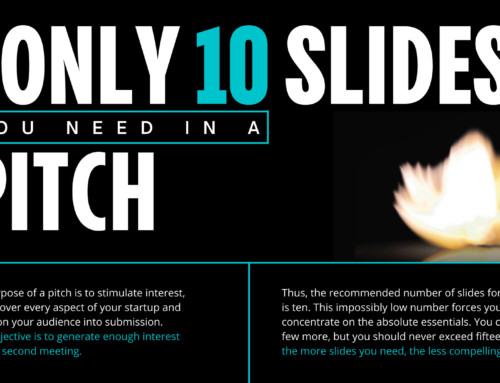A blog called “This is going to be BIG!” contains a provocative counterpoint to my VCAT. Basically, the person scored Mike Moritz of Sequoia (ie, the guy who invested in Google) within the framework of my test.
This proves that you can always find an example to prove or disprove anything. But as mother used to say, “Guy, it doesn’t matter what people say about you as long as they link to your blog.” :-)




As long as they link
Guy, it doesnt matter what people say about you as long as they link to your blog.
Michael Moritz
Vía How to change the world.
…
I don’t think it was your point to say that a person could not learn working at a VC firm. I thought your point was that you should know how to do something so you aren’t learning the basics on your portfolio companies. Yep, Mike Moritz probably learned some of the basics on his portfolio companies. The important point is, he learned.
He isn’t a 20-something done-nothing attitude-driven MBA. The counterexample was weak. Your quiz isn’t applicable to Mike Moritz.
Hey, I said the same thing two days ago:
http://radar.oreilly.com/archives/2006/11/the_vc_aptitude.html
I think it’s understood that there’s always an exception to every rule. I hate it when outliers are pointed out and used to discredit an argument. What it also does is put an end to any further discussion of best practices. This guy, Mike Moritz may be a great VC, but maybe he’d be an even better VC if he did score highly on your test, or maybe not.
Guy, I think what you’re trying to say is that one who aspires to become a great VC can maximize his chances by doing this and that.
Proving that your opinion is right is impossible. However, Buffet says it best, “I’d rather be almost right, than exactly wrong.”
My point is, we learn less from resenting an argument as “not the only way.” If one is going to make that claim, at least bring something productive to the table.
More importantly we should consider the merits of your advice by framing it logically and then considering it within the context of our own environments and ability. Only by doing so do we maximize learning from a credible source and improving the chances of reaching our goals.
Ouch ! Two new types of comments on Guy’s blog, that’s the sign that something is happening on the Blogosphere… Robots are able to identify the verification key ;-)
:)
Hey Guy,
It’s a sure thing that Charlie appreciates your Mom’s sentiments as well today! (note to self: start new kind of blog w/ strategy of only making counter-arguments to other blogs just to lure rebuttal traffic).
Actually, this is a really fun discussion. I know both of you and it seems you’re both taking extreme positions to prove a point. It’s the beauty of blogs vs other forms of publishing. You both are totally right in your own way.
Going by pure logic, which is what the VCAT asked one to apply to a process that has a bigger chance element than logic:
I do not think it is accurate to score Mike Moritz going by what he knows now, when the VC landscape looks very different from what it did when he began.
The context is also relevant – Mike Moritz is British; if you see what VC firms existed in the UK when he began (and their dominant preferences for hiring even now), he would have had to be at least an accountant (-5 then) to be hired. He was in the US and the VC industry norms were and are very different..
Likewise engineering may be important if you are a high-tech investor; for proteomics start-ups, for instance, if you dont get biochemistry and genetics, you might as well have a degree in Designing Etruscan Revival Jewellery for all one cares..
Likewise for a test based on score-bands and one which did not specify the flunking threshold, it is not logical to conclude that a person flunked it.
In passing: I asked a 65-year old Silicon Valley veteran to score the quiz. He created global recognition and businesses for 3 Silicon Valley high-tech brands during his 3-decade long career. He scored over 45, thrilled that for once his NOT having a degree (MBA) did not count against him. But when I asked him to drive to meet with folks over at Sand Hill Road (and then may be, hire me as his ‘assistant’), he said, ‘Child, I am retired, and my gardening and my golf swing are vastly more important to me than creating any more companies; I am happier being your reference and your mentor and your cheerleader..’
Ergo, scores are of any use to those on the outside of the industry dying to get in, more than to those who are in or those who never wanted to get in..
PS: Mothers are always right.
Guy, Good point. But I never thought I would see an advertisement for Microsoft Office on your website.
**************
In the blogosphere, anything can happen. :-)
Guy
Deng Xiaoping:
“No matter if it is a white cat or a black cat; as long as it can catch mice, it is a good cat.”
http://en.wikiquote.org/wiki/Deng_Xiaoping
I don’t think it is so much about exception or rules because tests like VCAT are heuristics not rules. VCAT predicts the odds of success–not actual success. GW Bush did little one expect someone should do intellectually and physically to prepare to become a US president yet there he is–twice–diasterous as it has been so far. But he’s still “the Decider”. Success in most endeavors in life has a luck (right time, right place, right network, right relatives) component that dwarfs everything else in the equation but no one, including me, likes to admit it because it makes us feel less on control of our destiny and more subject to the vagaries and vicissitudes of life. Talent, skill, and experience still play important roles–chance favors the well-prepared as the saying goes. But without the big luck factor, the VCAT won’t help you much.
I guess there are limits to every model… Pity since I scored 33 and thought I was getting sooo near to the point of speaking to the Sequoias of this world ;-) Even though I must confess I have no intention to make my next challenge be the last… so I’ll wait a bit before applying for a VC role.
Anyway, I really like the way you are taking a counterpoint and the humility you show by advertising it on your blog.
I’m one of those business school students working on the periphery of VC, and am quickly coming to the realization that there’s a definite need for more industry experience. It’s not about modeling or valuing companies…it’s about the operational side as well. It’s definitely better to learn hands-on than to learn for the first time from the companies you’re investing in.
http://southpawtiger.blogspot.com/
Guy,
I think your test exposes the hype around being a VC and “management consulting”. I worked as a programmer for one of the late 90s internet consulting firms (likes of Viant , scient, razorfish ) and got to see a lot of these “consultant types” from close range. They commanded huge salaries, ate and talked too much,drew up fancy strategy documents, but when it came to the 2001 downturn they were the first to be let go as they could not get new business.
These people are not much capable of generating revenue for anybody, except for themselves. Quite a few internet success stories are those of superficial achievements,
built to cash in, to get a required audience and then sell out.